

Wu jian xing zhe zhi Sheng si qian xong
Hong Kong 2020
Genre:
Crime, Thriller
Director:
Ally Wong Ka-Fai
Cast:
Michael Tse
Chau Pak-ho
Kenneth Chan
Ray Lui
Lin Shiga
Oscar Leung
Hui Siu-hung
Kenny Wong

The Infernal Walker

Story: Ting (Michael Tse) has been infiltrating the Fuk Wor triads as an undercover cop for seven years. When another undercover cop gets busted and the gang wants to kill him, there's little he can do to help. However, he manages to tip off the police, who then show up shortly afterwards. Some people in his organization think that Ting might be a traitor because the police have already managed to prevent three major deals within half a year. Moreover, the organization's boss cannot afford any mistakes with the next deal on the horizon as he wants to open a new trade route to Hong Kong for purer drugs. Sung Jing Kwong (Kenneth Chan) from the Eastern Trade Company is supposed to help with this. But Sung has completely different plans. Not only does he have a mole within the triads, but he also placed one of his men within the police. Tuen (Chau Pak-ho) made a career in the police force very quickly and leads an anti-triad unit that is supposed to put a stop to the Fuk Wor triads. In the meantime, however, Tuen also married, built a new house and a good life for himself. As a result, he feels torn about whether he should continue to pass on important information to Sung. Sung is aware of this, and he already has a plan to get his way anyway. In doing so, the game becomes more and more deadly for Ting...

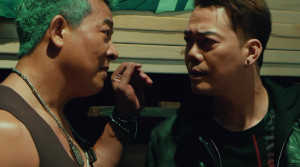


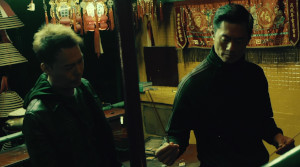
Review: It's not easy to find a decent thriller from Hong Kong these days. With its title "The Infernal Walker" already promises to be nothing more than just a mixture of "Infernal Affairs" and "Line Walker", brazenly copying everything that could add up to a suspenseful thriller. But since the reviews weren't all that bad, at least not entirely, and because nowadays you have to take what you can get coming out of Hong Kong, maybe you should give such a flick a fair chance. Funnily enough, you get exactly what you'd thought you get when lowering your expectations. Sometimes it's pretty bold what was put together here, but there are also a few surprisingly well thought-out story elements. Still, that doesn't change the fact that the movie looks like it's some kind of hybrid between big screen production and TV entertainment. But the direction is not the only problem here.
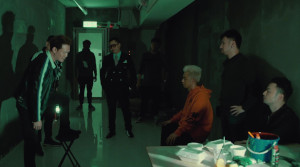
Nevertheless, the introduction can be considered quite decent. We immediately realize that Ting is an undercover cop, but at the same time, we ask ourselves why his gangster buddies can't read his face as well as we can. Shortly afterwards, the most important gangsters are introduced to us at a meeting only to then immediately show us the "opposing party" as well. That's quite a lot, but you can still easily tell the individuals apart, even though they don't show any distinct character traits apart from a few peculiarities. Everyone gets a few moments on the screen, but the characters are dropped just as quickly as they are introduced, which is especially irritating with a friend of Ting's, whose daughter we get to know briefly. Are we supposed to feel particularly sorry for the daughter after her father dies? But if so why isn't this aspect revisited later on? And this is just one example of many.

Ting, played by Michael Tse ("Turning Point"), shows the typical doggedness as he doesn't want his seven years as an undercover agent go out the window, and when the air is getting thin, we are also able to root for him to some extent. But it's nowhere near enough to properly engage us emotionally within the story. The love interest, which would have had potential for more, doesn't change things either. Tuen recently married and his wife just serves as a means to make him look human. He is longing for a normal life, which is something that would have worked as a nice starting point to show his inner conflict. However, the only ventures into this direction are limited to him not being able to decide whether he should forward a few text messages to his actual boss or not. Of course, Ting and Tuen eventually meet, but since there is hardly any chemistry between them, the two characters, especially Tuen, remain quite colorless.

Every now and then there are some action scenes, but with them it becomes pretty clear that the budget was not very high. At least, there are no CGI effects that would have made everything look even cheaper. Nevertheless, it's not a sign of quality if falling into a river is shown twice in different shots or if you get a freeze frame every now and then. Nevertheless, "The Infernal Walker" can still be quite gripping, at least in certain respects. Whenever the gangsters upset plans and Ting has to somehow send the updated information to his superior, or if the viewer already knows that x or y has been busted, but is not immediately eliminated for strategic reasons, this can be quite interesting and even creates a few exciting scenes. Now and then, the script offers some nice treats, even though they're nothing earth-shattering.

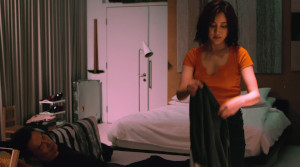
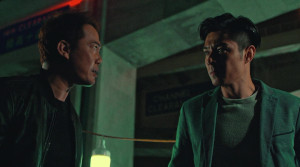

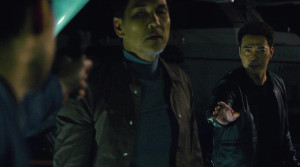
Unfortunately, this gets ruined by the cheap-looking direction on several occasions. Especially the flashbacks stand out negatively, not only because of the filter used, but also because of the strangely blurred images and the little bit of slow motion we get. Since this stylistic device is used quite often, it quickly becomes annoying. Then there is the soundtrack which always sets in completely unexpectedly and inappropriately or which sometimes just sounds horrible. In addition, there are a few continuity errors, for example when a gangster loses his knife only to then suddenly have it back in his hand a moment later. Even with a rather cheap production, you shouldn't get the feeling that it just tried to make some money off the fans of the works that it copied. Of course, the ending is very mainland compliant too, which robs the flick of its Hong Kong identity. In the end, "The Infernal Walker" is a mediocre movie, at best, aiming at fans of crime thrillers about moles, but it is certainly not a must-see.

Disclaimer










